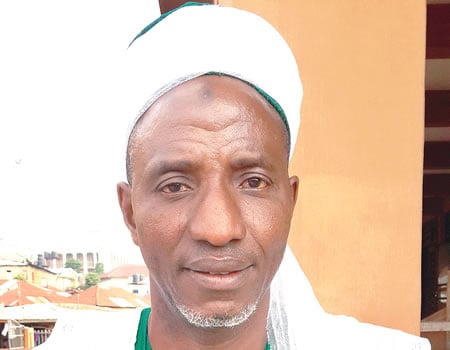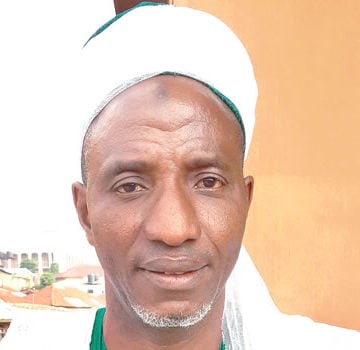Muslims rounded off Ramadan fast only recently. How can they retain the virtues they have gained therein, chiefly taqwa, God-consciousness?
Allah has set aside the month of Ramadan for us to attain a measure of perfection as Muslims. That is why it is only during this month that Allah chains Shaytan and his brethren. Prophet Muhammad said people come out of Ramadan in two folks. He said of the first folk that, he who fasts during the month of Ramadan with a strong faith, hope and trust in Allah will have all his past sins forgiven. That means such a person would be like a newborn child, who is sinless. And about the other folk, the Prophet said, he who witnesses Ramadan but could not avail himself or herself of the blessings therein but hunger, such a person would be among those that will be disgraced on the Day of Judgement. That is the reason why we impress it on the audience at praying grounds on Eid day that as we come out of Ramadan, they should choose to be among those that have attained taqwa (piety) who would be counted as successful, with whom Allah would be pleased. God-consciousness is the true meaning of taqwa, which means you are ever conscious of Allah in all that you do, whether mundane or spiritual. If Ramadan could not change your iniquities, and one remains what he was before Ramadan, then such a person is doomed. Seasonal worships like Ramadan are supposed to be taken very seriously so that we can make the most of them.
What I am saying in essence is that we should carry on the steadfastness that we gained in the month of Ramadan. We should maintain the fear of Allah. We must not depart from the humility, generosity and kindness which we exhibited during Ramadan. We should strive to continue to hold ourselves back from sins, from all evils as we did during Ramadan. To make a complete human being, to make a complete Muslim, there are certain qualities you must possess, which are piety, contentment, humility and the spirit of ceaselessly seeking the forgiveness of Allah. To attain an acceptable level of perfection before Allah and be one of those who will be warmly welcomed by Him on the Day of Recompense, you must have all these qualities.
What should be the preoccupation of intending pilgrims as they prepare to go to Makkah?
Hajj is an obligatory act in Islam but it has got conditions that must be satisfied before a Muslim can be eligible to perform it. Some of the conditions are that a Muslim must be of sound health physically and mentally and that he must have adequate provision made for the journey and for the immediate family he will be leaving behind. There must be consciousness of Allah which will serve as a guide for a successful conduct of hajj. These conditions must be taken seriously and met accordingly by the intending pilgrims. Then, while they are there, they must maximise that opportunity that Allah has given them. They must do their best to earn the pleasure of Allah because this is something that comes just once in a lifetime – this may be their only hajj, and this is not necessarily as a result of death but because the opportunity may not come again. It should be done with absolute seriousness, with utter consciousness and humility. They should engage themselves only in spiritually-rewarding exercises and avoid anything that could distract them.
What is your take on the growing clamour for the restructuring of Nigeria’s political system for there to be normalcy in the country?
It is only when our hearts are restructured that we can have a divinely restructured nation. The people that are clamouring for restructuring are not doing so out of sincerity. If you ask them how we should go about the so-called restructuring they are talking about and they begin to talk, soon, you will begin to pick holes in their ideas. This clamour is mainly borne out of selfishness. The advocates are only out to get favour for their regions. We may feel that we need restructuring but without changing what is in our hearts, I don’t think anything can come out of anything that may be eventually done in that direction. We should let our hearts give room for sincerity and godliness and that is how we can have restructuring according to God’s will. Let us leave Nigeria as it is. Let us all become new persons – the leaders and the led, old and young. Only when this happens can we have a Nigeria we can all be proud of.
Things have continued to go amiss in the country. Why do you think this is so?
What we have as leaders are a set of godless, heartless people. More unfortunately, there is a good number of Muslims among these so-called leaders, who are supposed to be role models in terms of governance. In fact, if these Muslims at the helm could exhibit traits of true Muslims and display the teachings of Islam, a time may come when Nigerians will wholeheartedly hand the affairs of this country to Muslims. What else do Nigerian Muslims want Allah to do for them? They have guidance and the potentialities. There are four principles in the Islamic political system. A leader must realise that he is a vicegerent of Allah – standing in for Allah, working for Allah, leading according to Allah’s injunctions. Once you realise that you are only in power to distribute the resources of the land equitably among the people, there will be consciousness. Then there is the principle of upholding amanah (trusts). A Muslim must realise that a position of authority in which he has found himself has been given in trust by Almighty Allah. The trust that human beings have in you is less important beside the trust that Allah has reposed in you, which He expects you to deliver accordingly. If Muslims could respect this principle, like I said earlier, we could have an experience whereby people of other religions would say let’s charge Muslims with all of our affairs. The third principle is ‘adl (justice), which Prophet Muhammad (salla llahu ‘alay-hi wa-sallam) displayed. But we lack this. Where are we going? The fourth principle, which is even among the principles guiding the operation of democracy, which has become the global political system, is accountability. If the people at the helm refuse to be accountable to the people that elected them, they should know that they are accountable to Allah and they have no choice in this. A society that lacks these four principles has nowhere to go. And it is quite unfortunate that in countries where they are not religiously inclined, they maintain these principles. Leaders that lack these principles cannot do things that would bring succour to the populace. In some of my recent lectures at Ansar-Ud-Deen, I asked my fellow Muslims if we were up to the task of being role models to others in the society. Only when we realise these principles could Muslims be able to play their part in rebuilding this nation. The number of Muslims in this country is reasonable enough for us to establish justice in the land, for us to have impact on the governance of this country. But alas! Many are only Muslim by name, and not by practice. It is only when we have a rethink, when we have a change of heart, when we gain consciousness of Allah that Nigeria can move forward.
There have been various established cases of murder in Nigeria but the country appears to be averse to the idea of capital punishment. Where do you stand on the question of the application of capital punishment for such a serious offence as murder? What do you think should be done to discourage wanton killings in the country?
Punishing a murder by death is a divine prescription and no right-thinking human being should oppose it. Allah has a purpose for prescribing punishments for wrongdoings. For Nigeria to become an ideal society, we must consider the application of capital punishment as enshrined in the Islamic law. For instance, a man kidnapped another and the victim died during the period of the captivity, is this not a clear case of murder? Has the kidnapper, which is a crime in the first instance, not added murder to the crime? And the Qur’an says whoever has killed should be killed. Let a proven murderer be killed. Let people who have been found guilty of killing others – for ritual purposes – be killed. Once the facts of a murder case has been established, justice should be allowed to take its course and justice is that he kills should be killed. Even the Bible says this. Why are we running away from the truth in this country? Who is that person that will pick holes in the Almighty’s injunction that he who kills should be killed? Even if a murder happens to be a child of the head of the country, let him be killed so as to serve as a deterrent. In this country, we live in fear day and night because we have failed to take advantage of the measures that have been designed for us to discourage crime.
By the way, I insist that if Nigeria adopts the stipulation of the Shari’ah which prescribes cutting of the hand for a proven offence of stealing, looting of the country’s treasury by politicians will reduce. If a former minister goes about with one hand, other politicians will take a cue, because it would be a stigma. Let us go back to Shari’ah. If a country in the Western world like China could have execution as punishment for stealing of public funds and the Qur’an says only cut off one hand, which of the two punishments is greater? But we are not being sincere in this country – both the leaders and the led. Life is sacred in the sight of Allah; you don’t just resort to killing. But, at least, let us start somewhere, because corruption has become the order of the day, thereby making our national resources too scanty to cater for all of us. Crime rate has increased because poverty has become cancerous in the society as a result of wanton stealing of public funds by the privileged few.






